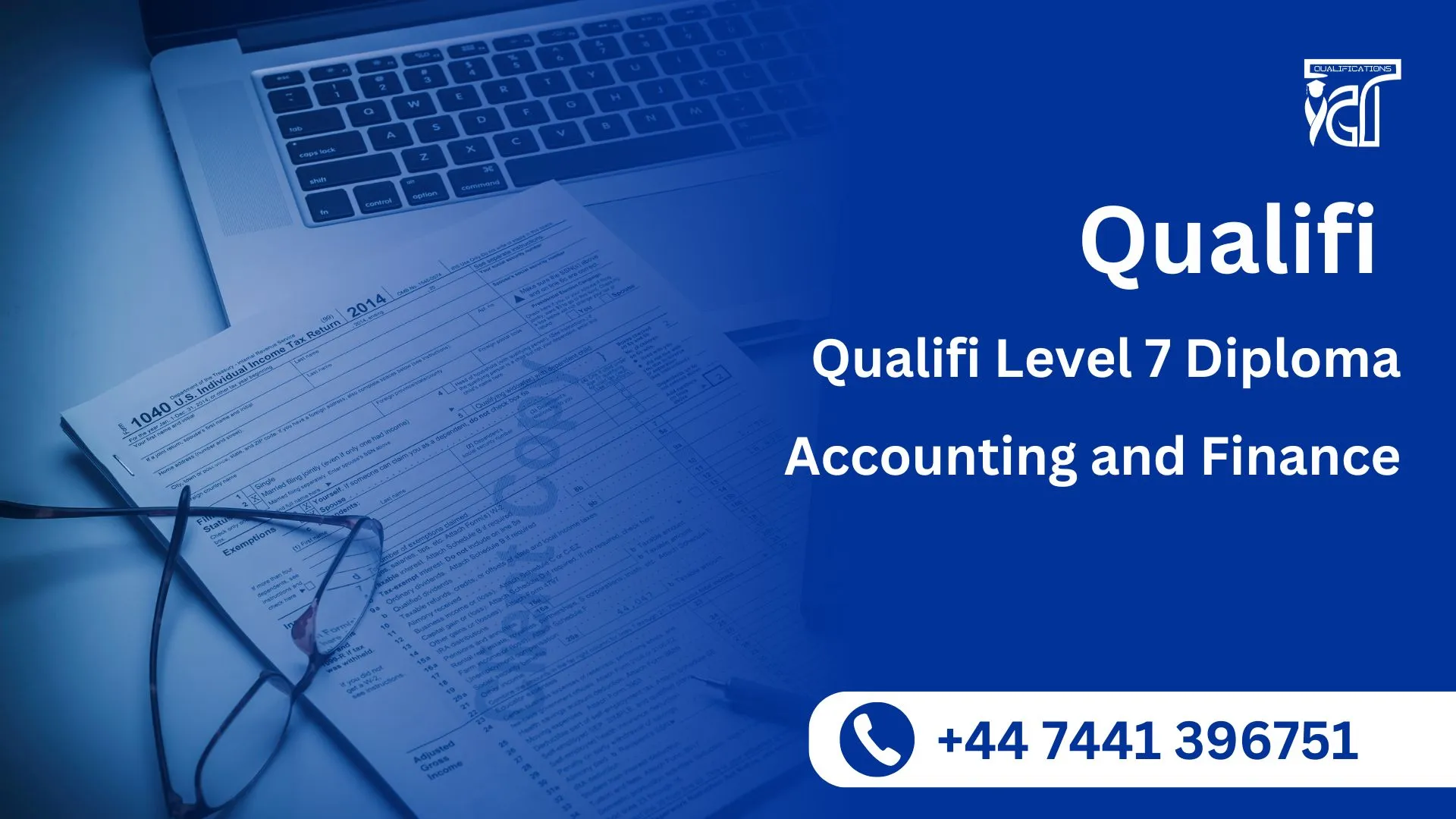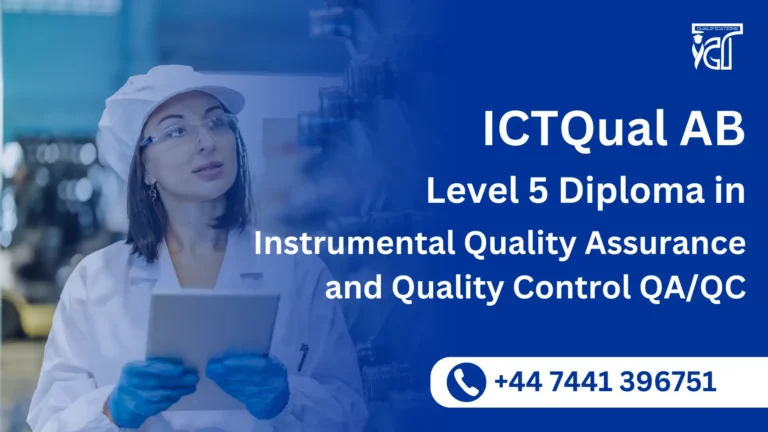The Qualifi Level 7 Diploma in Accounting and Finance is an Ofqual-regulated qualification designed for professionals looking to enhance their expertise in accounting, financial management, and strategic financial decision-making. This advanced qualification provides in-depth knowledge and skills necessary to excel in senior finance roles across a variety of industries, making it an invaluable credential for ambitious professionals.
This Level 7 diploma is tailored for individuals already working in accounting or finance, who are looking to deepen their understanding of complex financial concepts. It covers a broad range of topics, from financial reporting and management accounting to corporate finance and financial strategy. Designed for senior managers, financial directors, and experienced professionals, the course aims to equip learners with the advanced skills needed to drive financial decision-making at a strategic level.
The Qualifi Level 7 Diploma in Accounting and Finance is ideal for those seeking to further their careers in finance and accounting at a senior level. This qualification is entirely assignment-based, which means that learners are assessed based on practical assignments rather than traditional exams. This approach allows you to apply your learning to real-world scenarios, which enhances your ability to tackle complex financial challenges in your professional role. With a strong focus on practical knowledge, the diploma ensures you are equipped with the tools needed to make impactful financial decisions.
The Qualifi Level 7 Diploma in Accounting and Finance is the ideal choice for professionals who want to enhance their career in finance by gaining advanced knowledge and practical skills in accounting and financial management. With its Ofqual-regulated status, assignment-based learning, and comprehensive curriculum, this qualification provides learners with the expertise needed to take on senior finance roles and make informed financial decisions. Whether you are looking to progress in your current career or take on new challenges in the financial sector, this diploma offers the tools and credibility to help you succeed.
Qualifi Level 7 Diploma in Accounting and Finance
Qualifi Level 7 Diploma in Accounting and Finance consists of 6 mandatory units having 1200 TQT and 480 GLH. Candidates must complete all of the following Mandatory units.
| Sr# | Unit Title | Credits | GLH |
| 1 | Strategy and Global Finance | 20 | 80 |
| 2 | Strategic Financial Management | 20 | 80 |
| 3 | Strategic Auditing | 20 | 80 |
| 4 | Ethical Behaviour and Corporate Governance | 20 | 80 |
| 5 | Corporate Reporting | 20 | 80 |
| 6 | Financial Analyst | 20 | 80 |
GLH (Guided Learning Hours) and TQT (Total Qualification Time) are terms commonly used in vocational qualifications to help define the amount of time a learner is expected to spend on their studies.
1. GLH (Guided Learning Hours)
GLH refers to the number of hours a learner spends being directly taught, supervised, or supported during their course. This includes the time spent in activities such as:
- Classroom instruction
- Practical workshops
- One-on-one tutoring or mentoring sessions
- Online learning sessions with tutor support
In other words, GLH represents the time that learners are actively engaged with their instructors or learning activities.
2. TQT (Total Qualification Time)
TQT represents the total amount of time a learner is expected to invest in completing a qualification, including:
- GLH (Guided Learning Hours): Time spent on direct learning, as explained above.
- Self-Directed Learning: This includes time spent on independent study, research, assignment completion, preparation for exams, and any other work the learner does outside of direct teaching hours.
TQT is a broader measure that includes all the time required to achieve the qualification. It helps learners and employers understand the overall commitment required for the qualification.
Key Differences Between GLH and TQT:
- GLH focuses on direct learning with guidance or supervision.
- TQT includes GLH as well as independent study time and other learning-related activities.
Example:
If a qualification has a TQT of 600 hours and a GLH of 250 hours, it means the learner should spend 250 hours in direct learning (classroom, online, or tutor-led sessions) and 350 hours on independent study or research.
Learning Outcomes of Qualifi Level 7 Diploma in Accounting and Finance
Strategic and Global Finance
- Identify the concept of globalisation and evaluate the investment process involved in relation to globalisation.
- Evaluate the impact of global business environment on the national and multinational organisations.
- Evaluate and recommend strategies which will result in the enhancement of the value on an organisation.
- Be able to evaluate the financial consequences of strategic decisions and presentation of report to the management.
- Identify appropriate sources of finance and evaluate the risk involved and the cost of in managing the global risk.
- Identify and explain suitable techniques to manage global risk.
- Critical assess potential investment decisions available and the strategies applied in the global environment.
Strategic Financial Management
- Understand and critically appraise the significance of strategic management and decision making to the performance of the organisation and apply and critique the various forms of internal and external business and strategic analysis and formulation.
- Understand and evaluate the key financial theories relevant to financial decision making and critical application of strategic implementation techniques inclusive of balance scorecard and portfolio management tools.
- Evaluate the role of culture on strategy, including managing change and be able to analyse the effects.
- Evaluate and apply stakeholder analysis.
- Critically evaluate corporate and business valuation techniques.
- Evaluate performance measurement systems for an organisation and application of problem solving and financial analysis techniques to strategic business problems.
Strategic Auditing
- Identify and evaluate the history and the current regulatory environment for auditing.
- Understand and critically apply the rules of professional conduct for the auditors.
- Evaluate the importance of legal and professional requirements when performing the audit
- Critically analyse the effectiveness of audit monitoring processes.
- Identify the risk involved in an audit and the use of suitable measures to minimise the risk.
- Be able to identify and explain the linkage between accounts preparation and the conduct of audit.
- Identify and critically assess on the current developments in auditing.
Ethical Behavior and Corporate Governance
- Explain what a profession is and identify the application of governance law and practices in the national and international context.
- Identify the nature and importance of corporate governance and ethical behavior and critical evaluation of ethical issues in relation to corporate activity and recommend solutions.
- Assess the impact of financial reporting in relation to a wide range of stakeholders
- Identify the principal approaches of governance, identifying and assessing how the risk should be managed in order to achieve good corporate governance.
- Research and communicate complex and leading-edge issues in CSR and governance, in an appropriate format.
Corporate Reporting
- Identify and understand the main sources of regulatory framework.
- Explain the significance and the general impact of regulatory framework on the businesses.
- Identify and assess accounting concepts and theories.
- Understand how to implement accounting calculations and information.
- Critically evaluate accounting information.
- Be able to study and criticise on specific accounting regulations
- Identify and appraise key accounting policies and practices within corporate accounting.
Financial Analyst
- Critically evaluate the strengths and weaknesses the different types of securities.
- Analyse and explain the regulation of, and procedures relating to, the trading of securities and new issues in the world markets, including the London Stock Exchange (LSE).
- Know how to apply the principles of investment theory, security and market analysis and efficiency.
- Analyse the principles of taxation and their implications, including income tax, capital gains tax, inheritance and corporation tax.
- Critically evaluate the effectiveness of the law and regulation in controlling the financial services industry.
- Know how to plan, manage and review client portfolios according to customer profile and the needs in order to recommend and justify appropriate types of savings and investment.
1. Ofqual-Regulated Qualification
The Qualifi Level 7 Diploma in Accounting and Finance is an Ofqual-regulated qualification, ensuring that the course meets high academic standards. It is widely recognized within the finance industry, enhancing the value of your qualification and boosting your professional credibility.
2. Flexible, Assignment-Based Learning
This qualification is assessed through assignment-based learning, offering flexibility for professionals. You can complete assignments at your own pace, balancing work and study, while applying theoretical knowledge to real-world scenarios. There are no traditional exams, making it ideal for those with busy professional schedules.
3. Advanced Knowledge and Skills
The course covers advanced topics in financial reporting, corporate finance, management accounting, and financial strategy. This equips learners with comprehensive knowledge to manage complex financial decisions at a senior level, preparing them for leadership roles in accounting and finance.
4. Career Advancement Opportunities
Completing the Qualifi Level 7 Diploma significantly enhances your career prospects. With in-depth financial management skills, you will be qualified for senior roles such as Finance Manager, Financial Director, Chief Financial Officer (CFO), and other senior positions within the financial sector.
5. Practical Application
The assignment-based approach focuses on real-world financial challenges, enabling you to directly apply what you learn to your job. This hands-on learning ensures you gain practical experience in tackling financial problems and making strategic financial decisions.
6. Global Recognition
As an Ofqual-regulated qualification, the diploma is recognized globally, opening doors to career opportunities not only within the UK but also in international markets. Employers around the world value this qualification for its high academic standards and practical focus.
7. Enhanced Leadership and Strategic Thinking
The course develops your ability to think strategically, integrate financial management with business strategy, and lead financial operations. You’ll be able to drive organizational growth, make informed decisions, and improve overall business performance.
8. Improved Decision-Making and Problem-Solving Skills
By exploring advanced financial concepts, you will develop enhanced skills in financial decision-making and problem-solving. These skills are essential for navigating complex financial environments and making decisions that positively impact your organization.
9. Networking and Professional Development
Completing this diploma provides access to a network of finance professionals, enabling you to exchange ideas, insights, and opportunities. You can enhance your professional development and grow your network within the financial sector.
Conclusion
The Qualifi Level 7 Diploma in Accounting and Finance offers a wide range of benefits, from its Ofqual-regulated status to the flexible, assignment-based learning format. With its comprehensive coverage of advanced financial topics and practical application, this diploma prepares professionals for senior roles in the finance and accounting sectors, equipping them with the skills needed to make strategic, high-level financial decisions. Whether you’re seeking career advancement, skill enhancement, or leadership opportunities, this course provides the expertise to achieve your goals.
The Qualifi Level 7 Diploma in Accounting and Finance is designed for experienced professionals in the finance and accounting sectors who are looking to deepen their expertise and advance to senior management roles. The ideal learner is someone with a solid understanding of finance, accounting, and business principles, and is aiming to refine their skills for strategic financial decision-making at a higher level.
1. Finance and Accounting Professionals
- Accountants, finance managers, and financial analysts who want to progress to senior positions like Financial Director, CFO, or Financial Controller. This qualification will provide the in-depth knowledge required for higher responsibilities in financial management.
2. Experienced Professionals Seeking Career Advancement
- Professionals with several years of experience in accounting or finance who are seeking to move into leadership roles or enhance their strategic decision-making skills. The diploma is perfect for those looking to take the next step in their careers by acquiring advanced financial knowledge.
3. Senior Managers and Business Leaders
- Senior managers in business or operations who want to enhance their understanding of financial strategy and financial performance. This course will help them make informed financial decisions and integrate financial management into overall business strategies.
4. Business Consultants and Advisors
- Business consultants or financial advisors who specialize in providing strategic guidance and solutions for companies. This course will strengthen their ability to advise clients on complex financial matters, such as corporate finance, financial planning, and risk management.
5. Professionals in Non-Finance Roles Seeking Financial Knowledge
- Senior professionals or managers in non-financial roles, such as marketing directors or operations managers, who wish to develop a deeper understanding of finance to better contribute to business strategy and financial decision-making.
6. Entrepreneurs and Business Owners
- Entrepreneurs or business owners who wish to manage their company’s financials more effectively or seek to grow their businesses. This qualification will provide them with the skills to make sound financial decisions and manage financial resources effectively.
7. Candidates with Relevant Educational Background
- Those with a Level 6 qualification (such as a Bachelor’s degree) or equivalent in accounting, finance, business, or a related field. The course is ideal for individuals with a foundational understanding of financial concepts who wish to acquire advanced expertise in accounting and finance.
8. Individuals Seeking a Flexible Learning Option
- Professionals with busy work schedules who are looking for a flexible, assignment-based learning format that allows them to study at their own pace. This course structure provides the freedom to balance work and education effectively.
Conclusion
The Qualifi Level 7 Diploma in Accounting and Finance is ideal for experienced finance professionals, senior managers, business consultants, and entrepreneurs looking to enhance their strategic financial knowledge. It is perfect for those aiming for senior roles in finance or seeking to gain a deeper understanding of financial management to drive business success. With its focus on advanced financial concepts and practical application, this diploma provides the skills and credibility to progress in the competitive finance industry.
The Qualifi Level 7 Diploma in Accounting and Finance provides learners with advanced knowledge and skills to progress academically and professionally in the finance and business sectors.
1. Academic Progression
- Eligibility to progress to a Master’s degree (MSc, MA, MBA) in Accounting, Finance, or Business Administration.
- Opportunity to pursue specialized postgraduate programmes such as Financial Management, Risk Management, or International Finance.
- Direct entry to doctoral studies (PhD/DBA) in accounting, finance, or business management.
2. Professional Certifications
- Opportunity to advance towards professional qualifications such as ACCA, CIMA, CPA, or ICAEW.
- Eligibility for membership in professional accounting and finance bodies globally.
- Enhanced preparation for chartered and certified status in the financial industry.
3. Senior Career Roles
- Progression into senior financial leadership positions such as Finance Director, Chief Financial Officer (CFO), or Head of Finance.
- Opportunities in multinational corporations, banks, investment firms, and government finance departments.
- Access to roles like Financial Controller, Senior Auditor, Risk Manager, or Corporate Finance Specialist.
4. Consultancy and Advisory Opportunities
- Ability to work as a financial consultant or advisor to businesses and high-net-worth individuals.
- Opportunity to specialize in taxation, auditing, risk analysis, or investment strategy.
- Potential to become a policy advisor in economic and financial planning.
5. Entrepreneurial Pathways
- Potential to establish your own accounting or financial consultancy firm.
- Opportunity to provide outsourced finance, auditing, or tax advisory services.
- Ability to design and manage financial strategies for SMEs and startups.
6. International Career Development
- Recognition as a qualified professional in global financial markets.
- Opportunities to work in international banking, auditing firms, and cross-border financial services.
- Pathway to expatriate roles in regions with high demand for finance professionals such as the Middle East, Europe, and Asia.
Entry Requirements
Register Now
Qualification Process
Qualification Process for the Qualifi Level 7 Diploma in Accounting and Finance
- Self-Assessment:
Begin by evaluating your eligibility to ensure you meet the qualification requirements, including work experience, knowledge, and language proficiency. - Registration:
Complete your registration by submitting the required documents, including a scanned copy of a valid ID, and paying the registration fee. - Induction:
An assessor will conduct an induction to confirm your eligibility for the course and explain the evidence requirements. If you do not meet the criteria, your registration will be canceled, and the fee will be refunded. - Assignments & Evidence Submission:
Provide all assignments and the necessary evidence based on the assessment criteria outlined in the course. If you are unsure of the required evidence, consult with the assessor for guidance on the type and nature of evidence needed. - Feedback and Revision:
The assessor will review your submitted evidence and provide feedback. Evidence that meets the criteria will be marked as “Criteria Met,” while any gaps will be identified. You will be asked to revise and resubmit if needed. - Competence Evidence:
Submit final evidence demonstrating that all learning outcomes have been met. This evidence will be marked as “Criteria Met” by the assessor once it is satisfactory. - Internal Quality Assurance (IQA):
The Internal Quality Assurance Verifier (IQA) will review your evidence to ensure consistency, quality, and compliance with standards. - External Verification:
The IQA will submit your portfolio to Qualifi’s External Quality Assurance Verifiers (EQA) for final confirmation. The EQA may contact you directly to verify the authenticity of your evidence. - Certification:
Upon successful completion of all checks, Qualifi will issue your official certificate, confirming that you have attained the Qualifi Level 7 Diploma in Accounting and Finance.
FAQs for Qualifi Level 7 Diploma in Accounting and Finance







